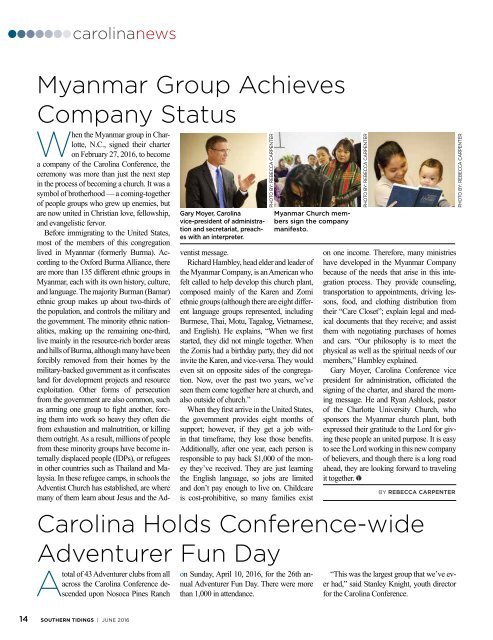Joy of Service
June16
June16
You also want an ePaper? Increase the reach of your titles
YUMPU automatically turns print PDFs into web optimized ePapers that Google loves.
carolinanews<br />
Myanmar Group Achieves<br />
Company Status<br />
When the Myanmar group in Charlotte,<br />
N.C., signed their charter<br />
on February 27, 2016, to become<br />
a company <strong>of</strong> the Carolina Conference, the<br />
ceremony was more than just the next step<br />
in the process <strong>of</strong> becoming a church. It was a<br />
symbol <strong>of</strong> brotherhood — a coming-together<br />
<strong>of</strong> people groups who grew up enemies, but<br />
are now united in Christian love, fellowship,<br />
and evangelistic fervor.<br />
Before immigrating to the United States,<br />
most <strong>of</strong> the members <strong>of</strong> this congregation<br />
lived in Myanmar (formerly Burma). According<br />
to the Oxford Burma Alliance, there<br />
are more than 135 different ethnic groups in<br />
Myanmar, each with its own history, culture,<br />
and language. The majority Burman (Bamar)<br />
ethnic group makes up about two-thirds <strong>of</strong><br />
the population, and controls the military and<br />
the government. The minority ethnic nationalities,<br />
making up the remaining one-third,<br />
live mainly in the resource-rich border areas<br />
and hills <strong>of</strong> Burma, although many have been<br />
forcibly removed from their homes by the<br />
military-backed government as it confiscates<br />
land for development projects and resource<br />
exploitation. Other forms <strong>of</strong> persecution<br />
from the government are also common, such<br />
as arming one group to fight another, forcing<br />
them into work so heavy they <strong>of</strong>ten die<br />
from exhaustion and malnutrition, or killing<br />
them outright. As a result, millions <strong>of</strong> people<br />
from these minority groups have become internally<br />
displaced people (IDPs), or refugees<br />
in other countries such as Thailand and Malaysia.<br />
In these refugee camps, in schools the<br />
Adventist Church has established, are where<br />
many <strong>of</strong> them learn about Jesus and the Ad-<br />
Gary Moyer, Carolina<br />
vice-president <strong>of</strong> administration<br />
and secretariat, preaches<br />
with an interpreter.<br />
ventist message.<br />
Richard Hambley, head elder and leader <strong>of</strong><br />
the Myanmar Company, is an American who<br />
felt called to help develop this church plant,<br />
composed mainly <strong>of</strong> the Karen and Zomi<br />
ethnic groups (although there are eight different<br />
language groups represented, including<br />
Burmese, Thai, Motu, Tagalog, Vietnamese,<br />
and English). He explains, “When we first<br />
started, they did not mingle together. When<br />
the Zomis had a birthday party, they did not<br />
invite the Karen, and vice-versa. They would<br />
even sit on opposite sides <strong>of</strong> the congregation.<br />
Now, over the past two years, we’ve<br />
seen them come together here at church, and<br />
also outside <strong>of</strong> church.”<br />
When they first arrive in the United States,<br />
the government provides eight months <strong>of</strong><br />
support; however, if they get a job within<br />
that timeframe, they lose those benefits.<br />
Additionally, after one year, each person is<br />
responsible to pay back $1,000 <strong>of</strong> the money<br />
they’ve received. They are just learning<br />
the English language, so jobs are limited<br />
and don’t pay enough to live on. Childcare<br />
is cost-prohibitive, so many families exist<br />
on one income. Therefore, many ministries<br />
have developed in the Myanmar Company<br />
because <strong>of</strong> the needs that arise in this integration<br />
process. They provide counseling,<br />
transportation to appointments, driving lessons,<br />
food, and clothing distribution from<br />
their “Care Closet”; explain legal and medical<br />
documents that they receive; and assist<br />
them with negotiating purchases <strong>of</strong> homes<br />
and cars. “Our philosophy is to meet the<br />
physical as well as the spiritual needs <strong>of</strong> our<br />
members,” Hambley explained.<br />
Gary Moyer, Carolina Conference vice<br />
president for administration, <strong>of</strong>ficiated the<br />
signing <strong>of</strong> the charter, and shared the morning<br />
message. He and Ryan Ashlock, pastor<br />
<strong>of</strong> the Charlotte University Church, who<br />
sponsors the Myanmar church plant, both<br />
expressed their gratitude to the Lord for giving<br />
these people an united purpose. It is easy<br />
to see the Lord working in this new company<br />
<strong>of</strong> believers, and though there is a long road<br />
ahead, they are looking forward to traveling<br />
it together.<br />
BY Rebecca carpenter<br />
Carolina Holds Conference-wide<br />
Adventurer Fun Day<br />
A<br />
total <strong>of</strong> 43 Adventurer clubs from all on Sunday, April 10, 2016, for the 26th annual<br />
Adventurer Fun Day. There were more<br />
across the Carolina Conference descended<br />
upon Nosoca Pines Ranch than 1,000 in attendance.<br />
Photo By: Rebecca Carpenter<br />
Myanmar Church members<br />
sign the company<br />
manifesto.<br />
Photo By: Rebecca Carpenter<br />
“This was the largest group that we’ve ever<br />
had,” said Stanley Knight, youth director<br />
for the Carolina Conference.<br />
Photo By: Rebecca Carpenter<br />
14 SOUTHERN TIDINGS | June 2016


